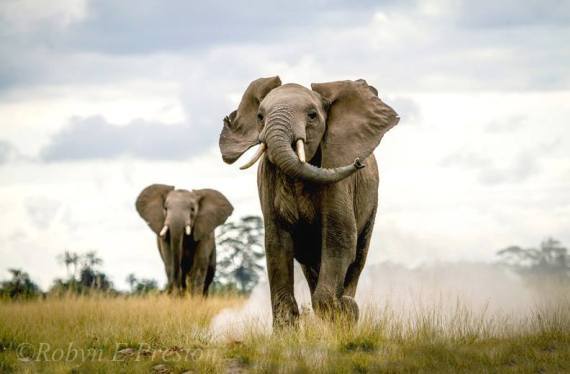Two days after New York passed the historic ban on the sale of elephant ivory, legendary conservationist Jane Goodall was in Auckland inspiring New Zealanders to save the elephants.
A petition has just been lodged with the New Zealand Government requesting a ban on all ivory trade, and the report states that on a per capita basis for ivory carving imports from 2009 to 2012, New Zealand easily tops the United States.
Just before the interview begins, Jane Goodall tells me about the very first time she saw elephants in the wild; their remarkable intelligence, and the precious bonds they share between family members. For a brief moment I am transported back to Goodall's world in the sixties, before the dreamer became an activist, and back when elephants were in abundance, and greed and status had not yet become the trigger to Africa's killing field.
"Every ivory bracelet, pendant or trinket represents a dead elephant," says Goodall as reality suddenly casts a dark shadow over our discussion. "Every voice and every country counts, and so long as there are loopholes for selling ivory legally, the illegal trade will continue."
At least 96 elephants are killed every day, but the UN Messenger of Hope refuses to accept a world without this iconic species, and believes we can win this war if we tackle it on all fronts.
Her Roots & Shoots initiative connects hundreds of thousands of youth in more than 135 countries who take action to make the world a better place for people, animals and the environment. In China, by far the largest consumer of ivory, there are more than 900 active groups that are dedicated to educating and inspiring their own community to change cultural attitudes and lobby the government. A huge impact has already been made with the anti shark finning campaigns, and this proves that changing an ancient mindset is far from impossible.
"There are people in China that actually believe elephants shed their tusks, like stags shed their antlers," explains Goodall. "Other people believe all the ivory is from animals that have died a natural death, so education on these issues is very important."
However it will take years for political pressure and demand reduction to turn the tide on the elephant crisis, and Goodall stresses that it is absolutely crucial we support the rangers on the frontline - the men risking their lives every day as they go up against global syndicates.
"Sometimes rangers aren't even paid, and in some situations if they get killed their widow and children are thrown out of their homes because space is needed for the replacement. We need to make the rangers feel that they're valued."
It is no exaggeration that some of these rangers don't even have boots, and they're going up against AK47s with stun guns. However there has been a dramatic change in attitude and confidence after rangers in Africa have become better equipped. But it's a war out there, and wars are expensive.
A United Nations Environment Program report just released states that up to $12 million a year is made by terrorist groups trafficking elephant ivory. Profits are fuelling crime, corruption and violence in fragile African democracies, and it will take a lot of political will to tackle these problems.
But perhaps the greatest superpower in the world is public opinion on a global scale. It is the reason commercial whaling was banned worldwide, seal fur coats are more treacherous than trendy, and it is the reason the war on terror is ending and the war on poaching is just getting started.
The Jane Goodall Institute is working towards a critical mass of young people who will go on to become the next generation of conservationists, teachers, parents, lawyers and politicians, forging forward with an inherent understanding that if we really do care about the future we have to make tough decisions today.
"We have lost the ancient wisdom that considers each decision on how it will affect future generations," says Goodall. "We have to get back to thinking in a different way, beyond the next shareholder meeting, and beyond the easy political wins."
Dr. Jane Goodall believes in a future with elephants, so long as more people become aware of what is happening and lend their voice to the voiceless.
"Right now the eyes of the world are on political leaders in Africa who are allowing elephants to be slaughtered, and with a very strong movement now in China, and other countries where the ivory is exported to, well you just have to hope that all these people coming in from all these different directions is going to slow the crisis down in time to save the elephants, because we have to."
Jamie Joseph is a writer and environmental activist connecting with the world's thought leaders in the poaching crisis. Follow her journey back to Africa @ savingthewild.com - every voice counts.

